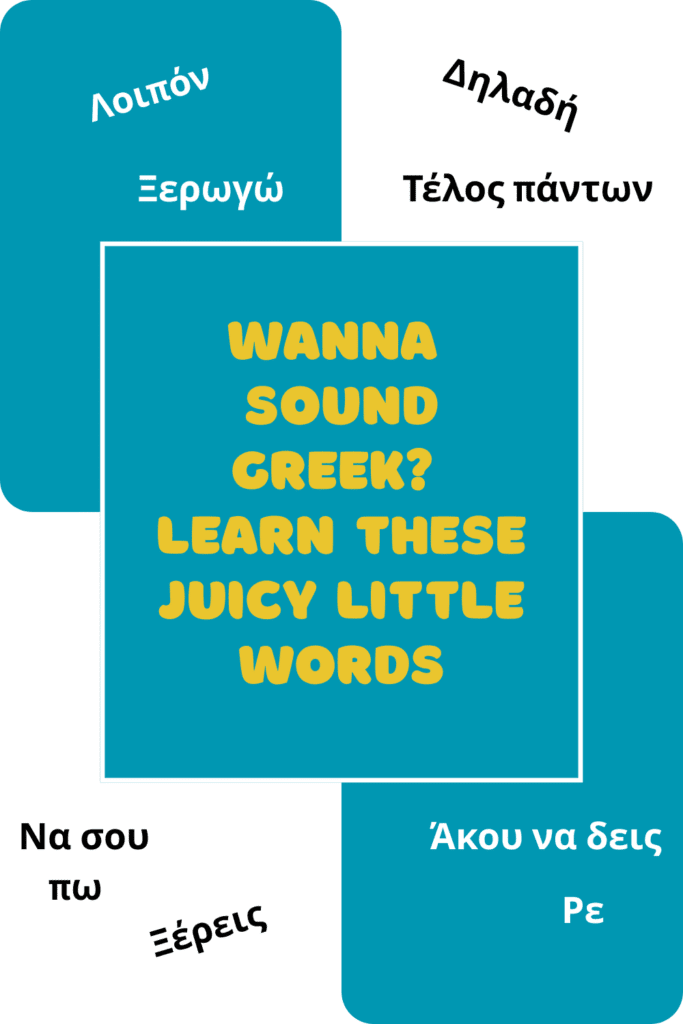Learn how to sound like a real Greek with everyday filler words like λοιπόν, ξέρεις, ρε, δηλαδή, and more—complete with fun examples, tips, and spicy Greek vibes!
Filler Words That Give Your Greek Real Vibes
Hello, my brave Greek-speaking adventurer!
So, you’re learning Greek, mastering your verbs, nailing your noun endings, and suddenly—bam!—you hear someone say:
“Λοιπόν… ξέρεις, δηλαδή ρε φίλε…”
And you’re like:
“Wait, was that a sentence? Or did they just summon a Greek spirit?”
Fear not! These magical little words are called fillers, and they are the secret sauce to sounding like a real Greek —not just someone reading from a textbook in a museum gift shop.
Ready to sprinkle some linguistic oregano on your Greek? Let’s go!
🥁 1. Λοιπόν – The “Alrighty Then” Word
What it means:
Literally “so” or “therefore,” but emotionally? It’s the Greek equivalent of “Okay, here’s the deal…”
When to use it:
- When you’re about to say something important:
Λοιπόν, πρέπει να σου πω κάτι.
(Lipón, prépi na su po káti)
Alright, I need to tell you something. - When you’re changing topics:
Λοιπόν, πώς πήγε η συνέντευξη;
(Lipón, pós píye i sinéntefksi?)
So, how’d the interview go? - Or just when you need dramatic flair:
Λοιπόν… (pause for effect)
Pro tip:
Say it with authority and a tiny head nod. Instantly 30% more Greek.
🤔 2. Ξέρεις – The “You Know…” of Greece
What it means:
Just like in English—“you know?”—but with bonus hesitation energy.
When to use it:
- When you need a second to gather your thoughts:
Ήταν, ξέρεις, λίγο αμήχανο.
(Ítan, xéris, lígo amíchano)
It was, you know, a little awkward. - When you want to connect with someone:
Ξέρεις τι λέω;
(Xéris ti léo?)
You know what I’m saying?
Pro tip:
This is your new best friend during brain freezes. Drop a “ξέρεις,” look thoughtful, and continue. Smooth.
😲 3. Δηλαδή – The Drama Queen of Fillers
What it means:
“I mean,” “like,” or sometimes “seriously?!”
When to use it:
- To explain or clarify:
Δηλαδή, δεν είναι τόσο απλό.
(Diládi, den íne tóso apló)
I mean, it’s not that simple. - To show disbelief or sass:
Δηλαδή τώρα μιλάς σοβαρά;
(Diládi tóra milás sovará?)
Wait, are you being serious right now?
Pro tip:
Flail hands a bit while saying it. Very Greek. Very effective.
👋 4. Ρε – The Untranslatable Power Word
What it means:
No direct translation, but think of it as “hey,” “dude,” or “yo”—with attitude.
When to use it:
- With friends, pets, lovers, enemies (basically everyone but your boss):
Ρε Μαρία, πού είσαι;
(Re María, pú íse?)
Hey Maria, where are you? - When you’re annoyed (but with love):
Re pedí mu, póses forés na sto po?
Dude, how many times do I have to tell you? - When expressing affection:
Ρε καρδιά μου, σ’ αγαπάω.
Re kardía mu, s’ agapáo
Babe, I love you.
Pro tip:
Only use it in casual settings. If you say “ρε” to your professor or your yiayia, expect the look. You’ve been warned.
😬 5. Ξερωγώ – “I dunno… you know?”
What it means:
A combination of “I don’t know” and “you know?” mashed into one word that expresses uncertainty and a shrug of the soul.
When to use it:
- When you don’t have a strong opinion:
Τι ώρα να πάμε; Ξερωγώ… στις εννιά;
(Ti óra na páme? Xero-gó… stis enniá?)
What time should we go? I dunno… like nine? - When you feel meh about something.
Σου άρεσε η ταινία; Ξερωγώ… ήταν οκ.
(Sou árese i tenía? Xerogó… ítan ok.)
Did you like the movie? I dunno… it was fine.
Pro tip:
Say it with a shrug, eyes up, lips pursed. Greek level: unlocked.
🙃 6. Να σου πω – “Let me tell you something…”
What it means:
Literally “Let me tell you,” but often used to grab attention before a point, complaint, or bit of juicy gossip.
When to use it:
- When you’re about to make a serious, sassy, or spicy comment.
Να σου πω… αυτό δεν ήταν σωστό.
(Na su po… aftó den ítan sostó.)
Lemme tell you… that wasn’t right.
Pro tip:
You can also use it to interrupt someone like a true Greek auntie.
🤷♀️ 7. Τέλος πάντων – “Anyway…”
What it means:
“Anyway,” “Whatever,” “Let’s just move on from this awkward mess.”
When to use it:
- To wrap up a topic you’re so over:
Δεν έχει νόημα, τέλος πάντων.
(Den échi nóima, télos pánton.)
There’s no point, anyway. - Or to signal a transition, like saying “Anyway, moving on…”
Pro tip:
Say it with a sigh. It adds emotional depth and flair.
😮 8. Άκου να δεις – “Listen to this…”
What it means:
“Brace yourself for this nonsense.” It’s part storytime, part rage release.
When to use it:
- When something absurd, dramatic, or juicy has occurred:
Άκου να δεις τι έγινε χτες βράδυ…
(Áku na dis ti éghine hstes vrádi…)
Listen to what happened last night… - When you’re so mad you need to vent with flair:
Άκου να δεις πώς μου μίλησε!
(Áku na dis pós mu mílise!)
Listen to how he talked to me!
Pro tip:
Start slow, dramatic, and slightly offended. Add a pause. Let the fury (or the tea) simmer. Bonus points for arm gestures and eye rolls.
😐 9. Ντάξει – “Okayyy…”
What it means:
Not just “okay”—this is “okay” with 17 different tones depending on mood. It can mean:
- “Cool, got it”
- “Ugh, fine”
- “Wow, that’s dumb but whatever”
When to use it:
- All the time. Seriously.
- Ντάξει, θα το κάνω.
(Dáxi, tha to káno.)
Fine, I’ll do it.
Pro tip:
Say it with a mix of resignation and sass for best results.
🌀10. Μη μου πεις! – “No way!”
What it means:
“Don’t tell me!” but actually means “OMG, tell me everything!”
When to use it:
- When reacting to gossip or shocking news.
Χώρισαν. – Μη μου πεις!
(Chórisan.” – “Mi mu pis!)
They broke up. – No way!
Pro tip:
Widen your eyes. Add dramatic lean-in. Nailed it.
🌪 11. Μπάααα… – “Pffff, as if.”
What it means:
Doubt, disbelief, or total rejection in one syllable.
When to use it:
- When someone says something too wild to believe:
Ο Γιώργος ήρθε στην ώρα του. – Μπάααα…
(O Yiórgos írthe stin óra tu. – Báααα…)
Giorgos showed up on time. – Pfffft, yeah right.
Pro tip:
Say it slowly with squinted eyes and a smirk. Sarcasm certified.
🎤 Wrapping It Up (Like a Souvlaki)
With all these juicy fillers in your pocket, you’re not just speaking Greek—you’re vibing Greek. These words don’t follow grammar rules. They follow vibe rules. 😎
Want to sound real? Practice them in casual convos. Want to sound super Greek? Use three in the same sentence.
Λοιπόν, ξέρεις, δηλαδή ρε φίλε… αυτό ήταν απίστευτο!
(Loipón, xéreis, diládi re fíle… aftó ítan apístefsto!)
So, you know, like dude… that was unbelievable!
And just like that—ρε φίλε, you’re not just learning Greek.
You’re living it. 🇬🇷🔥


